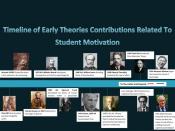People make errors all the time. Usually our errors are slight, like typos on the keyboard, and are easily correctable. Other times, our errors are a result of unwise practices, like tailgating on a slippery highway, and can be more consequential. Understanding why people make mistakes has been of scientific interest for many years and though scientists have been successful in developing theories about the causes of human error the fact remains.
Perception plays a key role in determining individual behaviour in organizations. In a variety of forms, organizations send their members messages regarding what they are expected to do and not do. People all see things differently and they all have their own perception of the functioning and operations of the particular establishment. People have their own, individual, unique picture or image of how they arbitrarily view what is to them the real world. Perception is the process by which stimuli are screened and selected to provide meaning and significance to be individual.
People's need influence their perceptions. For example, people who are hungry tend to see images of food in even the most ambiguous stimuli. A person with a strong need for security will focus his or her perceptions more strongly on the stability of the organization when offered a new job than will a person whose strongest need is for variety and challenge.
Motivation
Theories of motivation deal with two interrelated issues regarding individual behaviour in organizations. The first issue has to do with the choices that people make regarding the things that they will and will not do. The second issue concerns the effort or intensity that people put into the activities they choose to perform. Motivation theory helps us to understand some of the underlying psychological processes that generate motivation within individuals.
The most difficult...



"Why do people make mistakes?"
I enjoy reading this article. I found out that this article is totally related with my organisation behavior syllabus where motivation plays a vital role on individual behavior as well as ability, role perception and situational factor. The author explains well about personality, communication, macho context, and group behaviour which gives me a very good understanding of this article.
In addition, this article cleverly provides effective ways to motivate ourself, ways to handle job stress, and ways to learn new abilities. I will certainly get benefits from these articles and I can implement it in the future work.
A two thumbs up for the author!
0 out of 0 people found this comment useful.